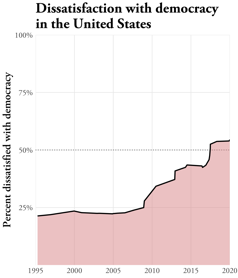Three findings are particularly noteworthy. First, over the past quarter century, satisfaction with democracy has fallen across the democratic world as a whole. In the mid-1990s, citizens in a majority of countries for which there are data felt satisfied with the performance of their democracies. Except for a brief dip in the ’90s following the Asian and Latin American financial crises, this remained true until 2015, when a majority of citizens turned negative in their evaluation of democratic performance. Since then, dissatisfaction has continued to grow.
Overall, the report estimates that the number of individuals who are “dissatisfied” with the condition of democracy in their country has risen by 10 percentage points, from 48 percent to 58 percent. (This observation is based on a constant-country, population-weighted sample of 77 democracies for which relatively complete data exist from the mid-’90s to today. This represents 2.4 billion individuals across the span of Europe, Latin America, sub-Saharan Africa, the Middle East, North America, East Asia, and Australasia.)
The second noteworthy finding is that the fall in democratic satisfaction has been especially pronounced in those countries that were supposed to be especially stable: high-income, developed democracies. During the ’90s, about two out of every three citizens of democracies in Europe, North America, Northeast Asia, and Australasia felt satisfied with the way their country was run. Today, a majority is, for the first time, dissatisfied.
But dissatisfaction with democracy is not evenly distributed across countries of different sizes. While the citizens of many small democracies, such as Switzerland and Luxembourg, have become more satisfied with their political system, the world’s most populous democracies, including France, Japan, and the United Kingdom, have moved in the opposite direction.
Finally, the drop in satisfaction with democracy is both especially rapid and especially consequential in the United States. For much of its modern history, America has viewed itself as a model democracy that could serve as an example to countries that wished to emulate its success. Survey data show that there was a little substance to this hubris: as recently as 10 years ago, three out of every four Americans said that they were satisfied with the state of their democratic system.
During the 2008 financial crisis, this began to change. And since then, Americans have become more pessimistic about their system every single year. For the first time on record, polls show that a majority of Americans (55 percent) are dissatisfied with their system of government.
This marks a profound shift in America’s view of itself—and its place in the world.
When we first reported that citizens in supposedly consolidated democracies were growing dissatisfied with their political systems, our argument appeared out of sync with the times. Moderates such as David Cameron and Barack Obama governed in London and Washington, D.C., the proto-populist Silvio Berlusconi had just been ejected from office in Italy, and Germany’s Angela Merkel enjoyed the largest parliamentary bloc her party had achieved in decades.
Source link
 Black America Breaking News for the African American Community
Black America Breaking News for the African American Community

